-
 Bitcoin
Bitcoin $83,309.8774
-1.88% -
 Ethereum
Ethereum $1,591.3660
-2.42% -
 Tether USDt
Tether USDt $0.9998
-0.01% -
 XRP
XRP $2.0864
-2.28% -
 BNB
BNB $580.9809
-0.68% -
 Solana
Solana $125.6682
-3.01% -
 USDC
USDC $0.9999
0.00% -
 TRON
TRON $0.2516
0.03% -
 Dogecoin
Dogecoin $0.1542
-3.08% -
 Cardano
Cardano $0.6142
-3.69% -
 UNUS SED LEO
UNUS SED LEO $9.3431
-0.92% -
 Chainlink
Chainlink $12.3641
-2.37% -
 Avalanche
Avalanche $18.8865
-5.31% -
 Stellar
Stellar $0.2358
-2.40% -
 Toncoin
Toncoin $2.8805
-0.91% -
 Shiba Inu
Shiba Inu $0.0...01169
-1.89% -
 Sui
Sui $2.1008
-4.00% -
 Hedera
Hedera $0.1574
-5.48% -
 Bitcoin Cash
Bitcoin Cash $318.9019
-1.04% -
 Litecoin
Litecoin $75.9077
-2.52% -
 Polkadot
Polkadot $3.5432
-3.69% -
 Dai
Dai $1.0000
0.00% -
 Bitget Token
Bitget Token $4.2538
-1.47% -
 Hyperliquid
Hyperliquid $15.1227
-5.40% -
 Ethena USDe
Ethena USDe $0.9991
0.00% -
 Pi
Pi $0.6199
-16.77% -
 Monero
Monero $217.3319
2.19% -
 Uniswap
Uniswap $5.2227
-2.58% -
 OKB
OKB $52.2436
1.28% -
 Pepe
Pepe $0.0...07082
-3.62%
How to understand the immutability of the blockchain?
Immutability in blockchain ensures data integrity by making transactions unchangeable once recorded, enhancing security and trust across various applications.
Apr 13, 2025 at 04:49 pm
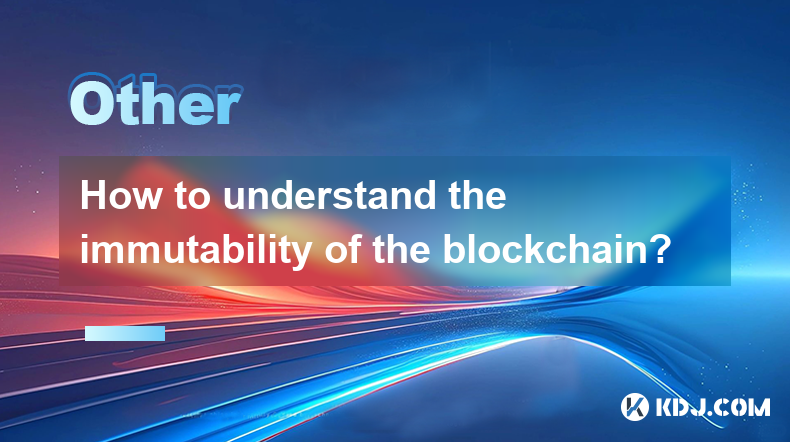
Understanding the immutability of the blockchain is crucial for anyone involved in the cryptocurrency space. Immutability refers to the unchangeable nature of data once it has been recorded on the blockchain. This feature ensures that once a transaction or piece of data is written to the blockchain, it cannot be altered or deleted. This characteristic is fundamental to the security and trust that blockchains provide, making them ideal for applications where data integrity is paramount.
What is Immutability in Blockchain?
Immutability in blockchain technology means that once a block is added to the chain, it becomes a permanent part of the ledger. Each block contains a list of transactions and a reference to the previous block, forming a chain of blocks. If someone tries to alter a transaction in a block, it would require changing all subsequent blocks, which is computationally infeasible due to the decentralized nature of the network.
How Does Immutability Work?
The process of maintaining immutability in a blockchain involves several key mechanisms:
- Hashing: Each block contains a unique hash of its data. If any data within the block changes, the hash changes as well, making it evident that tampering has occurred.
- Consensus Mechanisms: Protocols like Proof of Work (PoW) or Proof of Stake (PoS) ensure that all participants agree on the state of the blockchain. Any attempt to alter a block would need to be validated by the majority of the network, which is highly unlikely.
- Decentralization: The distributed nature of the blockchain means that copies of the ledger are stored across multiple nodes. Altering the blockchain would require simultaneous changes across all these nodes, which is practically impossible.
Why is Immutability Important?
Immutability is a cornerstone of blockchain's value proposition. It provides:
- Security: By ensuring that transactions cannot be altered, immutability protects against fraud and unauthorized changes.
- Transparency: All participants can verify the integrity of the data, fostering trust in the system.
- Auditability: The unchangeable nature of the blockchain allows for easy auditing and verification of past transactions.
Examples of Immutability in Action
To illustrate immutability, consider the following examples from the cryptocurrency world:
- Bitcoin: Once a transaction is confirmed on the Bitcoin blockchain, it becomes part of the permanent record. Even if a user tries to double-spend their coins, the blockchain's immutability ensures that the initial transaction stands.
- Ethereum Smart Contracts: Once deployed, a smart contract's code cannot be changed. This ensures that the rules of the contract are followed as intended, without the possibility of later alteration.
How to Verify Immutability on a Blockchain?
Verifying immutability on a blockchain involves several steps:
- Access a Block Explorer: Use tools like Blockchain.com for Bitcoin or Etherscan for Ethereum to view the blockchain's data.
- Select a Block: Choose any block and review its transactions and hash.
- Check the Hash: Verify that the hash of the block matches the one listed in the subsequent block. Any discrepancy would indicate tampering.
- Review Transaction History: Look at the transaction history of any address to ensure that past transactions remain unchanged.
Challenges and Limitations of Immutability
While immutability is a powerful feature, it also presents some challenges:
- Error Correction: Once data is recorded, it cannot be corrected if mistakes are made. This can be problematic in scenarios where errors need to be rectified.
- Privacy Concerns: The permanent nature of data on the blockchain can raise privacy issues, as sensitive information may remain accessible indefinitely.
- Scalability: The need to maintain the entire history of transactions can lead to scalability issues, as the blockchain grows in size.
Practical Implications of Immutability
The immutability of the blockchain has significant practical implications for various industries:
- Finance: Immutable ledgers can reduce fraud and increase trust in financial transactions.
- Supply Chain: By recording the history of goods on an immutable blockchain, companies can ensure the authenticity and provenance of products.
- Healthcare: Immutable records can improve patient data integrity and security, ensuring that medical histories remain accurate and unaltered.
Frequently Asked Questions
Q: Can immutability be compromised in any way?
A: While immutability is designed to be robust, it can be theoretically compromised through a 51% attack, where a majority of the network's computing power is controlled by a single entity. However, such attacks are extremely difficult and costly to execute, especially on well-established blockchains like Bitcoin and Ethereum.
Q: How does immutability affect the development of blockchain applications?
A: Immutability requires developers to carefully plan and test their applications, as any deployed code or data cannot be changed. This necessitates a more rigorous development process and can slow down the iteration cycle.
Q: Are there any blockchain platforms that offer mutable data options?
A: Some blockchain platforms, like Hyperledger Fabric, offer more flexible data management options that allow for certain data to be mutable. However, these platforms often trade off some of the security and trust benefits provided by fully immutable blockchains.
Q: How does immutability impact regulatory compliance?
A: Immutability can complicate compliance with regulations that require data to be deleted or altered, such as GDPR's right to be forgotten. Blockchain developers and users must navigate these challenges carefully to ensure they meet legal requirements while maintaining the benefits of immutability.
Disclaimer:info@kdj.com
The information provided is not trading advice. kdj.com does not assume any responsibility for any investments made based on the information provided in this article. Cryptocurrencies are highly volatile and it is highly recommended that you invest with caution after thorough research!
If you believe that the content used on this website infringes your copyright, please contact us immediately (info@kdj.com) and we will delete it promptly.
- Movement Labs and the Movement Network Foundation have launched an independent investigation into recent market-making irregularities related to the MOVE token.
- 2025-04-16 09:15:12
- Shiba Inu (SHIB) burn rate saw an over 2000% hike, leading to the removal of 20.83 million tokens from circulation.
- 2025-04-16 09:15:12
- Securitize Acquires MG Stover's Fund Administration Business to Become the Largest Digital Asset Fund Administrator
- 2025-04-16 09:10:12
- Trump administration plans to present Congress with cuts to most funding for public media
- 2025-04-16 09:10:12
- XRP (XRP) Displays Promising Growth Potential as It Currently Trades Above $2.00 and the 21-week EMA
- 2025-04-16 09:05:13
- BYDFi Lists $KERNEL, the Governance Token of KernelDAO, with Spot Trading Now Live
- 2025-04-16 09:05:13
Related knowledge
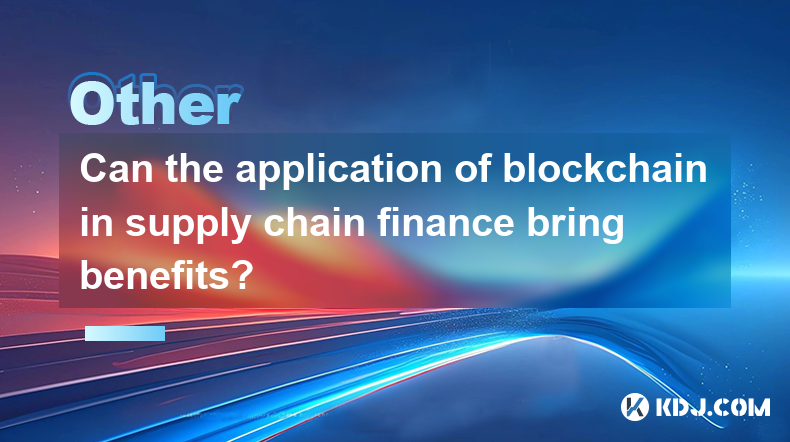
Can the application of blockchain in supply chain finance bring benefits?
Apr 15,2025 at 04:00pm
Can the application of blockchain in supply chain finance bring benefits? The integration of blockchain technology into supply chain finance has garnered significant attention in the cryptocurrency and financial sectors. This article explores how blockchain can potentially revolutionize supply chain finance, detailing its benefits and providing a compre...

Does the ranking of Chinese blockchain apps include cross-chain applications?
Apr 14,2025 at 04:00pm
The ranking of Chinese blockchain apps is a comprehensive evaluation that takes into account various aspects such as user base, transaction volume, and technological innovation. A pertinent question arises regarding whether these rankings include cross-chain applications. Cross-chain applications, which allow different blockchain networks to interact an...
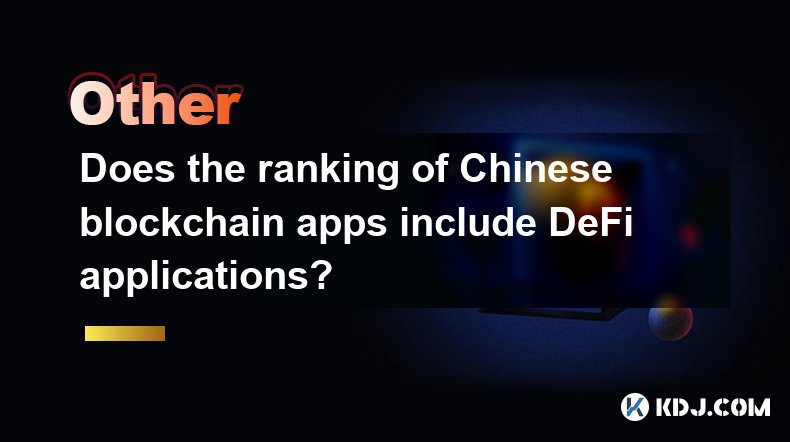
Does the ranking of Chinese blockchain apps include DeFi applications?
Apr 15,2025 at 06:57am
The ranking of Chinese blockchain apps is a comprehensive list that showcases the most popular and influential applications within the cryptocurrency ecosystem. One question that often arises is whether these rankings include DeFi applications. To answer this, we need to delve into the specifics of how these rankings are compiled and what types of appli...
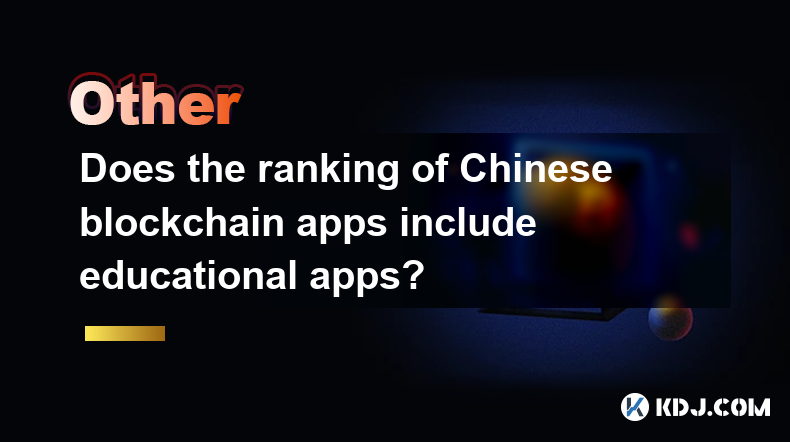
Does the ranking of Chinese blockchain apps include educational apps?
Apr 16,2025 at 03:35am
The ranking of Chinese blockchain apps often includes a variety of categories, from finance and gaming to social networking and beyond. One question that frequently arises is whether these rankings include educational apps. To address this, we need to delve into the specifics of how blockchain apps are categorized and ranked in China, and whether educat...
Does the ranking of Chinese blockchain apps include enterprise-level applications?
Apr 15,2025 at 06:42am
The ranking of Chinese blockchain apps often includes a variety of applications, ranging from consumer-focused to enterprise-level solutions. Understanding the scope and criteria for these rankings is essential to determine if enterprise-level applications are included. This article delves into the specifics of how Chinese blockchain app rankings are co...
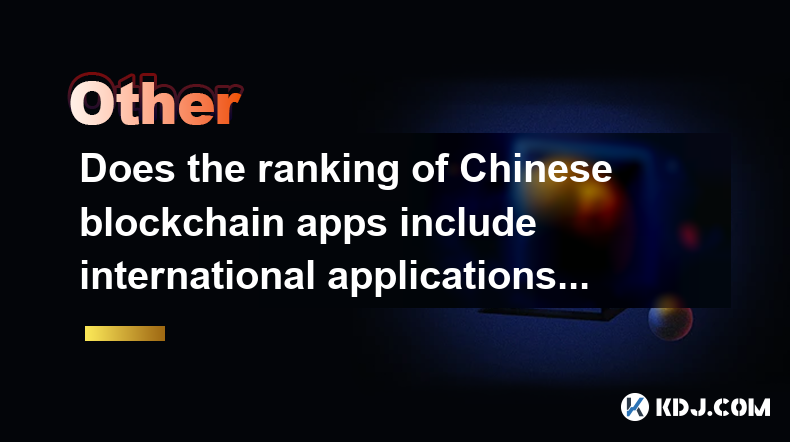
Does the ranking of Chinese blockchain apps include international applications?
Apr 16,2025 at 04:07am
The ranking of Chinese blockchain apps primarily focuses on applications developed and predominantly used within China. However, the question of whether these rankings include international applications is an intriguing one that warrants a detailed exploration. In this article, we will delve into the criteria used for ranking Chinese blockchain apps, th...

Can the application of blockchain in supply chain finance bring benefits?
Apr 15,2025 at 04:00pm
Can the application of blockchain in supply chain finance bring benefits? The integration of blockchain technology into supply chain finance has garnered significant attention in the cryptocurrency and financial sectors. This article explores how blockchain can potentially revolutionize supply chain finance, detailing its benefits and providing a compre...

Does the ranking of Chinese blockchain apps include cross-chain applications?
Apr 14,2025 at 04:00pm
The ranking of Chinese blockchain apps is a comprehensive evaluation that takes into account various aspects such as user base, transaction volume, and technological innovation. A pertinent question arises regarding whether these rankings include cross-chain applications. Cross-chain applications, which allow different blockchain networks to interact an...

Does the ranking of Chinese blockchain apps include DeFi applications?
Apr 15,2025 at 06:57am
The ranking of Chinese blockchain apps is a comprehensive list that showcases the most popular and influential applications within the cryptocurrency ecosystem. One question that often arises is whether these rankings include DeFi applications. To answer this, we need to delve into the specifics of how these rankings are compiled and what types of appli...

Does the ranking of Chinese blockchain apps include educational apps?
Apr 16,2025 at 03:35am
The ranking of Chinese blockchain apps often includes a variety of categories, from finance and gaming to social networking and beyond. One question that frequently arises is whether these rankings include educational apps. To address this, we need to delve into the specifics of how blockchain apps are categorized and ranked in China, and whether educat...

Does the ranking of Chinese blockchain apps include enterprise-level applications?
Apr 15,2025 at 06:42am
The ranking of Chinese blockchain apps often includes a variety of applications, ranging from consumer-focused to enterprise-level solutions. Understanding the scope and criteria for these rankings is essential to determine if enterprise-level applications are included. This article delves into the specifics of how Chinese blockchain app rankings are co...

Does the ranking of Chinese blockchain apps include international applications?
Apr 16,2025 at 04:07am
The ranking of Chinese blockchain apps primarily focuses on applications developed and predominantly used within China. However, the question of whether these rankings include international applications is an intriguing one that warrants a detailed exploration. In this article, we will delve into the criteria used for ranking Chinese blockchain apps, th...
See all articles























































































